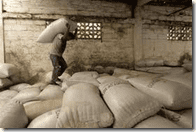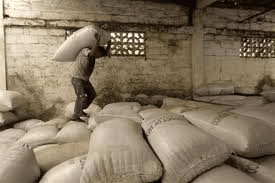 (Reuters) – For generations, indigenous coffee farmers in the lush mountains east of Mexico’s capital sold their beans to middlemen without understanding the workings of the international coffee market.
(Reuters) – For generations, indigenous coffee farmers in the lush mountains east of Mexico’s capital sold their beans to middlemen without understanding the workings of the international coffee market.
Now some of those same farmers, tired of falling victim to wild price swings, have taken the unique step of learning the complexities of derivatives trading to hedge their risk.
Native Nahuatl speakers from more than 60 small villages growing coffee on tiny plots around the picturesque town of Cuetzalan pool their cash to buy options contracts to cover their production, around 6,900 60-kg bags of coffee a year.
"We lived through the coffee crisis when prices were high and then fell dramatically, and many people went bankrupt," said Alejandro Martinez, president of the Maseual Xicaualis cooperative, or ‘Indigenous Power’ in Nahuatl.
"Now we have these new tools," said Martinez, wearing a traditional, hand-embroidered belt and boots in the warehouse off a winding mountain road in the state of Puebla where the co-op processes coffee and peppercorns .
Turning to the market, which has in the past brought them ruin as well as profits, as an insurance policy could be a new model for small producers facing volatility in world markets.
Ever since coffee prices collapsed at the beginning of the decade, small cooperatives have tried various ways to protect themselves, like selling "fair trade" beans or negotiating deals directly with roasters, but few have jumped to hedging.
The co-op here exports organic beans directly to Japan, Europe and the United States and also sells conventional coffee. With hedging, it now estimates its crop size and locks down a favourable price to sell at a later date on New York’s ICE Futures exchange, protecting itself from a price slump.
When the harvest is over, if the group still has inventories or picked more than expected, the farmers can buy options to sell at a higher price if the market is rising.
A communal budget affords them around eight contracts, each with 37,500 pounds of coffee. Martinez and other members track market trends on Internet pages from a small office built with hand-tied bamboo beams to decide when to make trades.
SOPHISTICATED MODEL
It was a long process — more than a year of training with Mexican firm GAMAA Derivatives — to enter a world dominated by large hedge funds, speculators and multinational importers.
"At first it seemed like talking to rural, indigenous farmers about hedging was like talking about aliens," said Leonardo Duran, an agronomist and advisor to the cooperative.
"We would ask, ‘what do you understand about the market in New York?’ and they would associate it with the market where they go to buy and sell their goods," he said. "It was unthinkable that you could negotiate a price for something without having the physical product. They thought there were containers of coffee piled up (in New York)."
But they got the hang of it and now GAMAA operates on the cooperative’s behalf for a fee. The group has started hedging against swings in Mexico’s peso currency as well since they earn dollars or euros but pay costs in pesos.
"Today It is not enough to just know what your parents knew about cultivating the land. Farmers need to know about finances," said Duran.
Highly organized and disciplined, the co-op is part of a larger network of associations called Tosepan that groups 5,800 families and does everything from building bamboo furniture to running an eco-hotel to producing honey.
"This example is quite sophisticated … hopefully it can be copied in Africa," said Hans Bogaard, head of agribusiness at Rabo Development, part of Dutch lender Rabobank Group.
"In bigger commodity crops its very usual to see big farmers dealing directly with Chicago, like soybean farmers in Argentina and Brazil, also in the US," he said, but he noted that it was rare in the coffee industry.
More than 60 percent of Mexico’s rural population is poor and the World Bank has looked at commodities price risk management as a way of combating rural poverty.
Farmers in the world’s No. 1 coffee producer Brazil tend to rely on traders at their huge cooperatives to take care of hedging on their behalf, while many forward sell their produce in exchange for loans that tide them over until harvest time.
The local exchange, the BM&FBovespa, also offers a "mini" futures contract covering just 10 60-kg bags, providing a means of protection for small, independent growers, but they are not widely used.
GOVERNMENT TOO SLOW
The co-op’s experiment sprang out of an innovative government program, Aserca, that subsidizes producers and food and livestock companies to hedge risk.
The government operates on behalf of the participants, bundling dozens of contracts for corn, wheat, sorghum and other products and creating a buzz on grains trading floors in Chicago when it makes a big move.
Mexico’s finance ministry also uses financial instruments to hedge oil exports, protecting public finances from sharp drops in the price of oil since crude revenues fund more than a third of the federal budget.
But the Tosepan group felt the government program moved too slowly. Aserca trades only during certain windows and pays at the end of the season even if prices move before then.
With GAMAA’s help, the co-op avoided disaster when prices fell in 2009. They hedged at $150 per 100-lb lot of coffee and were safe when prices dropped to $115, Martinez said.
New York’s benchmark arabica coffee contract is now more than double the level two years ago but is still volatile with prices falling around 20 percent since a peak in May.
Aserca hopes to eventually wean all producers off the government subsidies and wants more farmers to start operating on their own. The co-op is being eyed as a model to follow.
"The goal is for all the members to have information to make decisions," Duran said. "So their decisions have power."

Deprecated: strpos(): Passing null to parameter #1 ($haystack) of type string is deprecated in /home/agriviek8Qv/agriviet.net/public_html/wp-includes/comment-template.php on line 2522